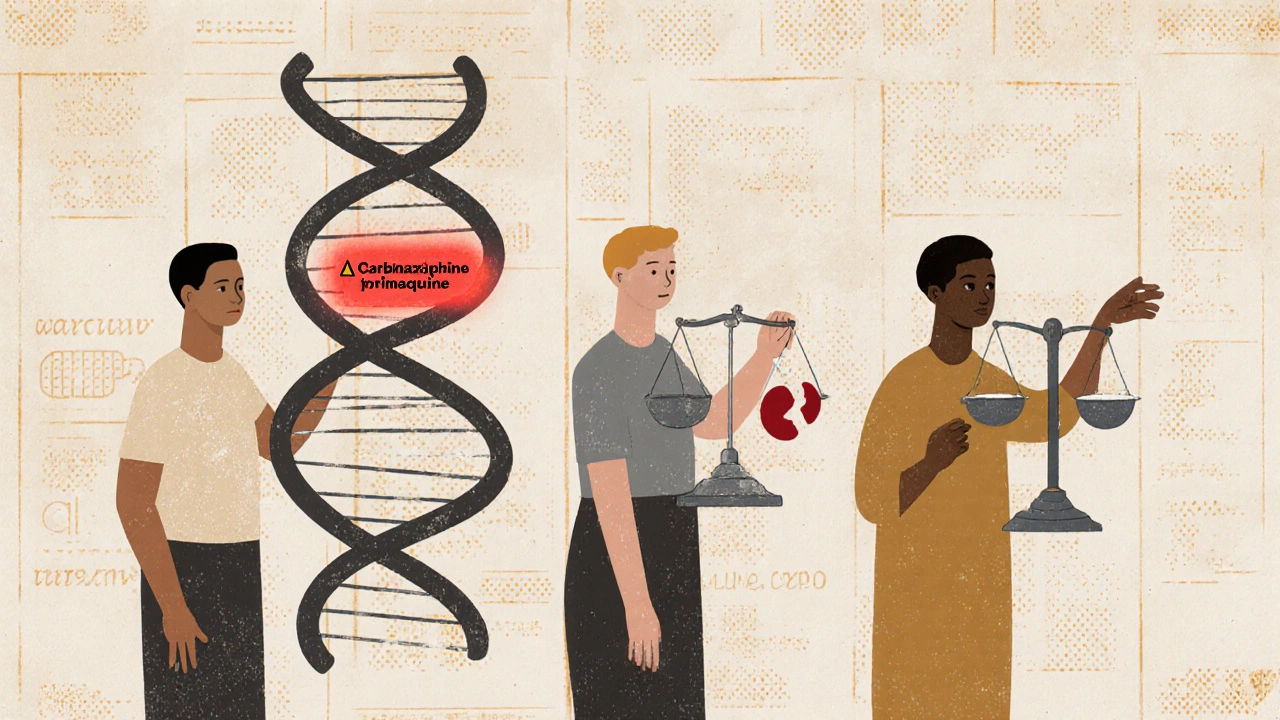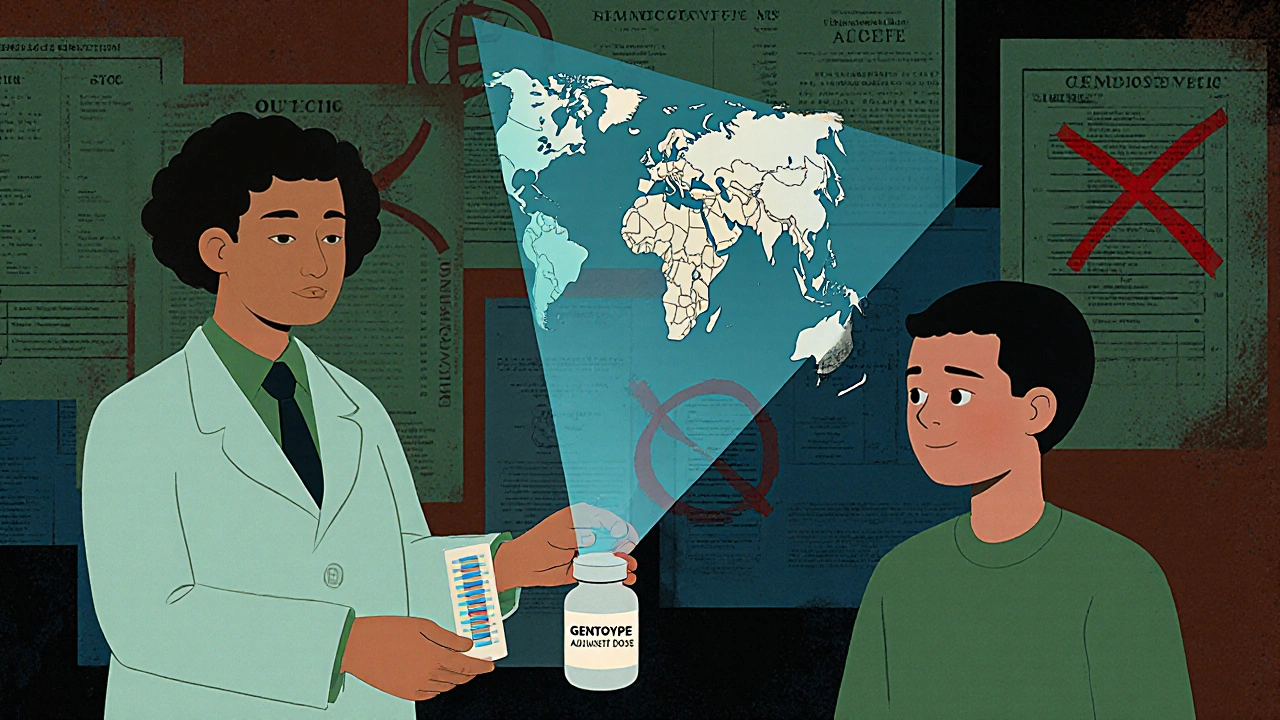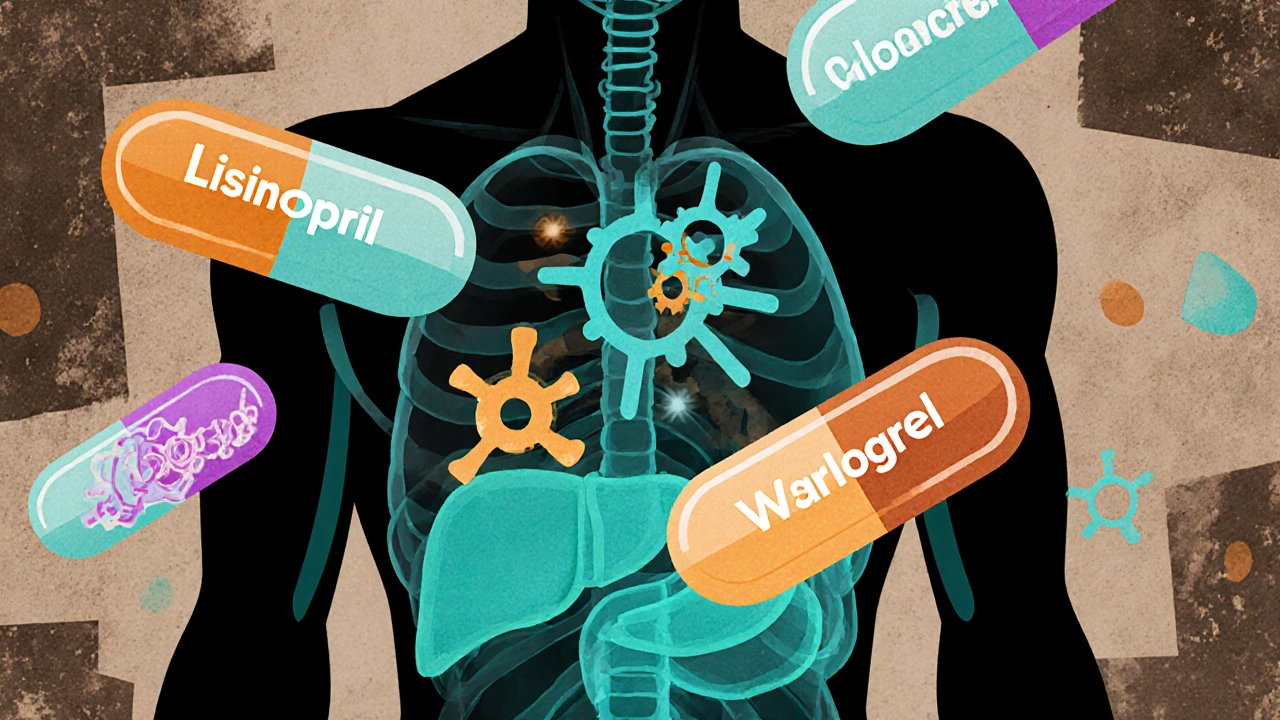Personalized Warfarin Dose Calculator
Estimated Daily Warfarin Dose
When you take a pill, your body doesn’t treat it the same way everyone else does. Two people with the same diagnosis, same dose, and same symptoms can have wildly different outcomes-one gets relief, the other gets sick. This isn’t random. It’s often down to genetics, and those genetic differences cluster in predictable ways across ethnic groups. The idea that ethnicity affects how drugs work isn’t speculation. It’s backed by decades of research, FDA approvals, and real-world patient outcomes.
Why Some Medications Work Better for Certain Groups
Take blood pressure meds. For many people of African descent, ACE inhibitors like lisinopril or losartan simply don’t lower blood pressure as effectively as they do in people of European descent. Studies show a 30-50% reduction in response. That’s not a small difference. It’s enough that the FDA approved a combination drug-isosorbide dinitrate and hydralazine-specifically for self-identified Black patients with heart failure in 2005. In clinical trials, this combo cut mortality by 43% compared to standard treatment. But here’s the catch: not all Black patients responded. And some non-Black patients did. That’s because race isn’t the cause. Genetics is.
The real players are enzymes in your liver, especially the cytochrome P450 family. These enzymes break down drugs. And their activity varies wildly based on tiny genetic changes called polymorphisms. One of the most studied is CYP2C19. This enzyme activates clopidogrel, a blood thinner used after heart attacks. About 15-20% of East Asians carry a version of this gene that makes them poor metabolizers. For them, clopidogrel barely works. In contrast, only 3-8% of European Americans and 2-5% of African Americans have this version. So a dose that saves a life in one group might be useless in another.
Genes That Can Kill You
Some genetic differences aren’t just about effectiveness-they’re about danger. The HLA-B*15:02 gene variant is a silent killer for certain populations. If you’re Han Chinese, Thai, or Malaysian, and you take carbamazepine (a common seizure and bipolar medication), you have a 1,000-times higher risk of developing Stevens-Johnson syndrome-a life-threatening skin reaction. This variant is present in 10-15% of those populations. In Europeans, Africans, or Japanese, it’s nearly nonexistent. Because of this, doctors in Southeast Asia now test for HLA-B*15:02 before prescribing carbamazepine. The FDA recommends it too. But testing isn’t universal. Between 2010 and 2020, over 1,200 serious skin reactions from carbamazepine were reported in Asian populations-many of them preventable.
Another example is G6PD deficiency. It affects up to 14% of African American men and up to 30% of people in malaria-prone regions. If you have this condition and take drugs like primaquine (used to treat malaria) or certain antibiotics, your red blood cells can rupture, causing severe anemia. It’s not about race. It’s about ancestry. G6PD deficiency evolved because it offered some protection against malaria. So if your ancestors came from Africa or Southeast Asia, you’re more likely to carry it. And if you don’t know, you could end up in the hospital.
Warfarin: A Dose That Depends on Your Ancestry
Warfarin, a blood thinner, has one of the most well-documented ethnic differences in dosing. European Americans typically need 5-7 mg per day. African Americans often need 7-10 mg. Why? Two genes: CYP2C9 and VKORC1. These control how fast your body breaks down warfarin. African Americans are far more likely to carry variants that make them process the drug faster. So they need higher doses to get the same effect. But even that’s not the whole story. Some African Americans have CYP2C9 variants that aren’t even found in Europeans. That means standard dosing formulas-based mostly on European data-often fail them.
Studies show that using race alone to guess warfarin dose leads to dangerous mistakes. One 2011 study found that 40% of African Americans had genetic profiles that made them respond completely differently than expected. That’s why pharmacogenetic testing is now recommended for warfarin users. But only 37% of U.S. hospitals offer it. So most patients still get dosed the old way: trial and error. And that’s risky.

Why Race Is a Flawed Proxy
It’s tempting to use race as a shortcut. It’s easy. But it’s also misleading. The American Heart Association pointed out in 2007 that even when groups show different average responses, there’s huge overlap. About 30-40% of African Americans respond just fine to ACE inhibitors. And many European Americans don’t. So if you assume all Black patients won’t respond to a drug, you might deny effective treatment to someone who needs it.
And the genetic diversity within so-called racial groups is massive. A Nigerian and a Khoisan person from southern Africa are more genetically different from each other than either is from a German. But both are labeled “Black.” That’s not science. That’s history. Race is a social category. Genetics is biological. And when you mix them up, you risk misdiagnosis, under-treatment, or even harm.
Dr. Sarah Tishkoff’s research at the University of Pennsylvania showed this clearly. Her team found that African ancestry, measured by actual DNA, predicted how well asthma patients responded to albuterol better than self-reported race. Those with higher African ancestry had 33% less bronchodilator response. But within that group, there was still wide variation. The answer isn’t to ignore race-it’s to go deeper.
The Shift Toward Genetic Testing
Leading institutions are already moving past race. The NIH’s All of Us program has enrolled 3.5 million people, 80% from underrepresented racial and ethnic groups. They’re building the largest, most diverse genetic database ever. Mayo Clinic has genotyped over 100,000 patients. Vanderbilt has 120,000. And the results? A 28-35% drop in adverse drug reactions among those who got genetic-guided prescribing.
The FDA is catching up. New drug applications now almost always include pharmacogenetic data. In 2022, 78% of new drug submissions included it-up from 42% in 2015. And labels are changing. Ivacaftor, a cystic fibrosis drug, no longer has race-based recommendations. Now, it’s all about CFTR mutations. If you have the right gene, you get the drug. No matter your ethnicity.
Organizations like the Clinical Pharmacogenetics Implementation Consortium (CPIC) now offer 27 gene-drug guidelines. Fourteen of them include ethnic considerations-but they’re all built on specific genetic markers, not skin color. The American Heart Association’s 2023 statement says it plainly: stop using race. Start using genotype.

What This Means for You
If you’re on long-term medication-especially for heart disease, depression, epilepsy, or asthma-ask your doctor about pharmacogenetic testing. It’s not a magic bullet. But it’s the closest thing we have to personalized medicine today. The test usually costs between $1,200 and $2,500. Insurance doesn’t always cover it. But if you’ve had bad reactions, or if your meds don’t seem to work, it could be worth it.
And if you’re mixed-race or from a population not well-studied in clinical trials (like Indigenous Americans, Pacific Islanders, or many African ethnic groups), your risk of being mis-dosed is higher. That’s because most genetic data comes from European populations. Only 19% of genome studies include non-European ancestry. That gap is shrinking, but slowly.
There’s no perfect system yet. But the future is clear: treatment should be based on your genes, not your label. Your skin color doesn’t tell your liver how to work. Your DNA does.
The Road Ahead
The global pharmacogenomics market is projected to hit $24 billion by 2028. That’s because more hospitals, insurers, and drugmakers are seeing the value. But progress depends on access. Testing needs to be affordable. Data needs to be diverse. Doctors need training. Right now, it takes 8-12 hours of training for clinicians to interpret these results correctly. Most haven’t had it.
The goal isn’t to erase ethnic differences. It’s to understand them-deeply, accurately, and ethically. We don’t need to treat people differently because of their race. We need to treat them differently because of their genes. And that’s a difference that could save lives.


Comments
steffi walsh
Wow, this is exactly why I started pushing for genetic testing after my dad had that awful reaction to warfarin. I didn’t know his ancestry mattered until the hospital finally ran the panel. Turned out he had a variant no one expected. We’re lucky we caught it before he bled out. Seriously, if you’re on meds long-term, just ask. It’s not expensive compared to an ER visit.
Also, shoutout to the All of Us program - we need more of this.
November 19, 2025 AT 05:47
Conor McNamara
theyre usin genetics to cover up the real truth: pharma companies dont wanna make drugs for everyone. they want the easy money. why test on 100k people when you can just say ‘black people dont respond’ and sell a special pill? its all profit. they even made that combo drug so they could charge 10x more. and dont get me started on how they ignore indigenous dna. they just dont care.
November 21, 2025 AT 04:04
Kristina Williams
so wait… you’re telling me my aunt who’s half mexican and half irish could die from a seizure med just because she looks ‘asian enough’? that’s insane. why don’t they just test everyone? it’s 2024. we have dna kits for pets. why am i still guessing my meds?
November 22, 2025 AT 17:58
Shilpi Tiwari
From a pharmacogenomics standpoint, the CYP2C19 polymorphism is a textbook case of population-specific allele frequency divergence. The East Asian poor metabolizer phenotype (rs4244285) has a minor allele frequency of ~0.18, while the European cohort hovers at ~0.15. But the real bottleneck isn’t the science-it’s the clinical infrastructure. Most EMRs still default to race-based algorithms because they’re hardcoded in legacy systems. We need EHR-integrated PGx alerts, not post-hoc genetic counseling.
November 23, 2025 AT 16:41
Riohlo (Or Rio) Marie
Oh honey, let me just say-this post is the kind of intellectual rigor we rarely see on Reddit. Truly, the way you dismantled the race-as-biology myth with precision and citations? Divine. I mean, the fact that the FDA approved BiDil as a ‘Black drug’ while ignoring that 40% of Black patients didn’t respond? That’s not science, darling. That’s colonialism with a white coat.
And don’t even get me started on how G6PD deficiency is framed as ‘African’ when it’s actually malaria-adapted-meaning it’s in Mediterranean, Southeast Asian, AND some Arab populations. But no, let’s keep our taxonomy tidy, shall we? After all, who wants messy data when you’ve got a nice little racial checkbox?
Also, I’ve been telling my rheumatologist for years: stop prescribing carbamazepine to ‘non-white’ patients without HLA-B*15:02 screening. She still doesn’t believe me. I think she’s afraid of being ‘racist’ by testing. Irony, isn’t it?
November 24, 2025 AT 16:52
Leilani O'Neill
Irish people don’t need genetic testing. We’ve been surviving on whiskey and bad decisions for 800 years. If your liver can’t handle a pill, maybe you shouldn’t be taking pills. This whole ‘genetic profiling’ thing is just American over-medicalization. We don’t need to know your SNPs to know if you’re sick. Just look at you. Are you pale? Then you’re probably fine. Are you dark? Then maybe skip the blood thinner. Simple. Efficient. No labs needed.
November 24, 2025 AT 21:12
Louie Amour
So you’re telling me I’ve been on the wrong dose of antidepressants for 7 years because my great-grandma was from Nigeria? And no one told me? That’s criminal. I’m suing my doctor. And the hospital. And the FDA. And maybe the entire pharmaceutical industry. This isn’t science-it’s eugenics with a PhD. Why didn’t they test me before I tried to kill myself? Because I looked ‘white enough’? That’s the system. That’s the fucking system.
November 26, 2025 AT 11:56
Shaun Barratt
While the empirical data presented herein is both compelling and methodologically sound, the underlying sociopolitical implications warrant deeper scrutiny. The conflation of ancestral genetic variation with socially constructed racial categories remains a persistent epistemological error in clinical practice. That said, the proliferation of pharmacogenomic databases-particularly those inclusive of non-European populations-represents a paradigmatic shift toward precision medicine. However, the logistical and economic barriers to widespread implementation remain formidable, particularly in resource-constrained settings. Further, the absence of standardized clinician training protocols for interpreting pharmacogenomic results constitutes a critical gap in translational readiness.
November 28, 2025 AT 03:13
Iska Ede
so like… if my DNA says i’m 3% african and 97% scandinavian but my doctor still gives me the ‘black patient’ dose because i have curly hair… am i the problem or is the system?
November 28, 2025 AT 04:34
Christine Eslinger
I’ve been a nurse for 22 years. I’ve seen people die because their meds didn’t work. I’ve seen people get sick because their dose was ‘standard’ but their genes said otherwise. This isn’t about race. It’s about biology. And we’re so close to getting it right.
My cousin? Mixed heritage. Took warfarin. Blew out a clot. Then they ran the test. Turns out she had the same variant as someone from Ghana-except she’s half Irish. The doctor was stunned. She’d been on the wrong dose for 3 years.
Don’t wait until you’re in the hospital. Ask for the test. Even if insurance says no. Pay out of pocket. It’s cheaper than a stroke.
And if your doctor says ‘we don’t do that here’? Find a new one. You deserve better.
November 29, 2025 AT 06:44
Gabriella Jayne Bosticco
This is why I always tell my patients: your body isn’t broken. The system is. We’ve been treating people like averages when we should be treating them like individuals.
My grandma had G6PD deficiency. She was from Jamaica. We didn’t know until she got sick after a malaria pill. She was 72. If they’d tested her in the 80s, she’d still be here.
Don’t be afraid to ask. Don’t be afraid to push. Your genes are telling you something. Listen.
November 29, 2025 AT 14:15
Brenda Kuter
They’re hiding the truth. The government and Big Pharma don’t want you to know this. They’re using ‘genetics’ as a cover to keep testing drugs on poor people and minorities while giving white people the ‘right’ doses. You think this is science? It’s a control system. They want you dependent on trial-and-error meds so you keep coming back. And the ‘testing’? It’s expensive so only rich people get it. That’s not medicine. That’s oppression.
And don’t believe them when they say ‘All of Us’ is helping. They’re just collecting your DNA to sell it. I’ve seen the documents. They’re already selling to insurers. You’re not a patient. You’re a data point.
November 30, 2025 AT 21:27